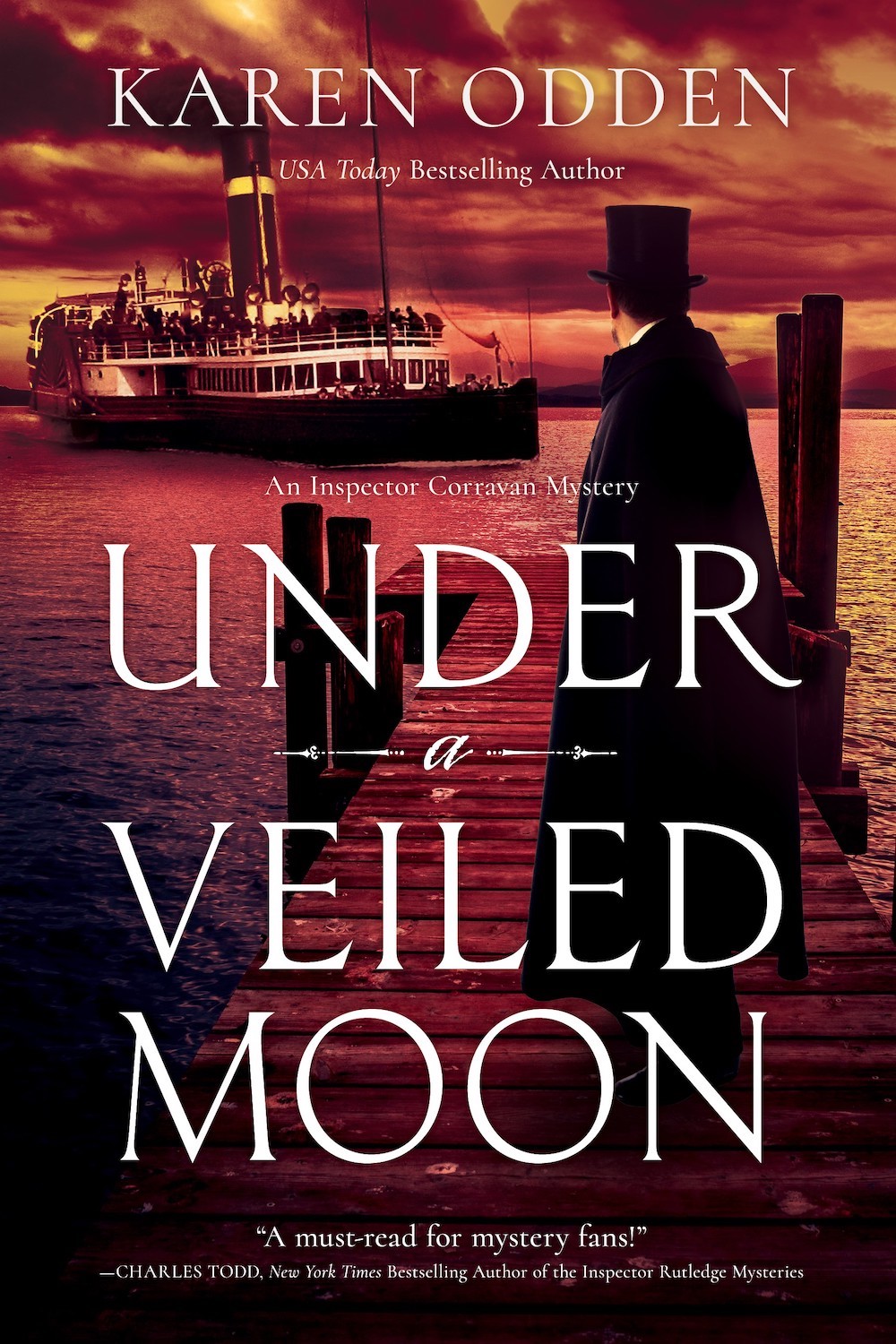Karen and I have a few things in common besides being authors. When I read her post, my heart went out to her. We both longed for a horse when we were children. We both love getting lost in a fictional world, either one we created or one created by another author. Reading about Scotland Yard detectives, especially those who snoop around London during the late 1800s, is another enjoyment we share. Read on and discover how writing fiction can be dangerous.

Getting Lost … and Dragging Others with Me
The first time I ever wrote something creative, I nearly burned the house down.
I was around ten years old. I liked sewing doll clothes, and one day, I came home from school and decided I was going to iron some fabric to make a dress for Maddie Mod (yes, I had a knockoff Barbie). I set up my small ironing board and my iron, and while waiting for it to heat up, I picked up Golden Cloud, the latest book of my horse craze reading obsession.
I didn’t own a horse, mind you. We lived in a working-class suburb in Rochester, New York, on around one-quarter of an acre, a lot small enough that we had to throw a frisbee low and short so as not to fly next door into the neighbor’s petunias. There was no room, let alone money, for a horse. But I fed my horse obsession with books. I tore through all of my father’s Black Stallion books, still in their luridly colored 1950s dust jackets. For around two weeks, I wanted to be Alec Ramsey, stranded on a desert island with a gorgeous, wild black horse and then tearing around the racetrack in Queens. I read Black Beauty (alas, poor Ginger!), National Velvet, and Misty of Chincoteague. My latest fix was a book called Golden Cloud, about a boy from Chicago, who is invited to his uncle’s horse ranch one summer and tames a palamino, so (of course) his uncle gives it to him! and invites him back every summer.
That day, as I read the final enthralling sentences of Golden Cloud, I longed to stay in that world. So I decided to write some poetry.
It was dreadful. One of the couplets went something like this:
When you hear my whistle, you know what I am wishing,
Toward me you are racing, your mane and tail _____
I am guessing you can fill in this word, given the deplorably bad twisting I did to English syntax to make this rhyme work.
Bad couplet after bad couplet, I wrote this poem.
Suddenly, I smelled smoke.
(Remember the doll clothes? The iron?)
I looked up, and there it was, brilliant red around the metal edges, with black scorch marks and flames forming on the ironing board cover. Having read my Nancy Drew, the girl who could handle any crisis, I pulled the plug out of the wall, raced to the bathroom, snatched up two Dixie cups of water, and ran back to throw them on the iron. The flames went out, and I went back to my bad poetry.
I couldn’t quite return to that lost feeling in Golden Cloud by rereading it – because for me a book was never as enchanting and immersive the second time through. There was an awareness I brought upon rereading … not quite “meta” but knowing what would happen next.
Looking back, I think I wrote that poetry to reproduce the feeling of being completely swept away, lost in another world. This is what I was wishing – even more than for a horse: to sweep myself back into that world and – even more important – to bring someone else with me, rather like we drag friends to a movie we loved, watching it a second time ourselves because we want them to be in that world with us.
Nowadays, I don’t write poetry (bad or otherwise). I write novels set in 1870s London. This world began to come alive for me in grad school at NYU in the 1990s, as I was writing my dissertation on Victorian railway disasters, the injuries they caused, and the bizarre symptoms that appeared belatedly, so as to link Victorian “railway spine” with our current ideas about PTSD. (Many people don’t know that Charles Dickens, for example, was in the Staplehurst railway crash of 1865, which wrecked his nerves and caused symptoms that led to his death five years to the day afterward.) In all five of my mysteries, I strive to present a fully-imagined, three-dimensional Victorian world in which readers can lose themselves – whether it’s the London streets, the rowdy music halls, the art and auction world, or the dark waters of the Thames.
In Down a Dark River and Under a Veiled Moon, my protagonist Michael Corravan is a former thief from seedy Whitechapel in East London. His adoptive family, the Doyles, are a close-knit Irish clan, and together with his adoptive brother Pat Doyle, Corravan becomes a dockworker, a lighter-man, and a bare-knuckles boxer – until the day he refuses to throw a boxing match and infuriates the bookies. Corravan flees to Lambeth, where he becomes a uniformed constable in the Metropolitan Police, working his way up the ranks. He is now thirty-one and making good as an inspector at Scotland Yard … but he’s Irish, which in the 1870s is a problem, as the Irish faced terrible discrimination. Corravan is rough around the edges, but he’s loyal, strong, smart, and at heart, he’s a rescuer – with his core identity anchored by his ability to save people’s lives and save people from the worst in themselves. This can cause problems when there are people who don’t want to be rescued from their own choices – like his younger brother Colin, who becomes ensnared in an Irish gang. Corravan solves his crimes by meeting people in out-of-the-way pubs, searching mildew-filled warehouses by the Thames, walking over pillared bridges, rowing boats on the oily Thames, riding in creaking hansom cabs, and making his way down dark alleys, truncheon in hand.
One of my favorite moments as an author is when someone says after reading one of my books, “I felt like I was there. I could smell it.”
To beckon people in, get them lost with me, in 1870s London. These days, this is what I am wishing.

BIO:
USA Today bestselling author Karen Odden received her PhD in English from NYU, writing her dissertation on Victorian railway disasters. She has taught English at UW-Milwaukee, written introductions for the Barnes & Noble Classics Series, and edited for the academic journal Victorian Literature and Culture (Cambridge UP). Unsurprisingly, when she turned to writing fiction, she camped out in 1870s London. Her first mystery, A Lady in the Smoke, was a USA Today bestseller. Her fourth mystery, Down a Dark River, an “Oprah Daily” pick, introduces readers to Scotland Yard Inspector Michael Corravan, a former thief and bare-knuckles boxer. The sequel, Under a Veiled Moon (2022), was nominated for the prestigious Lefty, Agatha, and Anthony Awards for Best Historical mystery. Karen serves on the national board of Sisters in Crime. She teaches writing workshops across the US and will be at Bouchercon 2023. www.karenodden.com
September 1878, London.
Michael Corravan, a former thief from seedy Irish Whitechapel, is making good as an inspector at Scotland Yard, until…
One night on the Thames, a 900-ton coal carrier smashes into the small wooden pleasure steamer the Princess Alice, shearing it apart and throwing all 650 passengers into the river. Only 130 survive. (True history.) The newspapers claim it is not an accident but an act of sabotage by the radical group, the Irish Republican Brotherhood.
For Corravan, born in Ireland, the case presents a profound challenge. As the newspapers link the IRB to further accidents, London threatens to devolve into terror and chaos. Meanwhile, his younger adoptive brother Colin has become entangled with an Irish gang. With the help of his loyal colleague Mr. Stiles and his love-interest Belinda Gale, Corravan uncovers the harrowing truth—one that will shake his faith in his countrymen, the law, and himself.
Website:
Buy buttons on amazon (hardcover, kindle, and audio)


Thanks, Karen, for joining me today on Writer Wednesday. I enjoyed reading about your intriguing Scotland Yard detective, Michael Corravan.
Thanks for having me! I love the books, birds, banter … speaking of which, we have Sandhill Cranes in our backyard today. 🙂
Wow! The cranes don’t usually make it all the way to the West Coast. I see them when I’m in Texas.
Thanks to Kathleen and Karen for this wonderful post about wishing, swishing, and beautiful writing, which both of you have in common.
Thanks, Saralyn!! I look forward to reading your book soon!
Lovely post, Karen. Yeah, that’s the fun of writing sometimes – trying to recreate a past world.
Thanks!! Yup – that past world. It’s like a magnet. 🙂